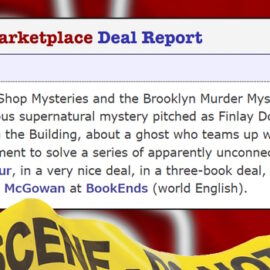This is the sixth post in the “How To Break Into Publishing” Series. If you’re coming in late, Part One: What Even is Publishing? (Different types of publishing) is available here!
There’s a saying that doesn’t feel very true when you’re in the querying trenches hoping to get the attention of just one agent, any agent – You aren’t just looking for an agent, you’re looking for the right agent for you. Frankly, you’re desperate. You want an agent so badly that any agent will do.
Except, they won’t.
A bad agent – or a bad agent for you – is so much worse than having no agent at all. It might not feel like it when you’re querying, but trust me on this.
I got lucky. I adore my agent (especially if they’re reading this). My agent is part business partner, part therapist. They’re my advisor and my cheerleader. They get me jobs. They play the bad guy when I need muscle, and repost my Instagram stories.
Caveat: My goal for this blog series is to educate, not discourage. Getting a book published seems so very simple at first glance. It’s really, really not! But when you (like me) would rather be writing than pretty much doing any other thing, it’s worth it. As always, this is based on my limited experience and limited understanding. Your mileage may vary!
Why Do You Need An Agent?
If your goal is to get a traditional publisher, especially one of the “Big 5”, you need an agent. Some (but not all!) indie pubs prefer to work with an agent. Some (but not most!) self pubbers work with an agent. On occasion, even the Big 5s will put out a call for unagented authors (but even then I would highly suggest you find an agent before you sign anything!)
Why do you need an agent? Agents get you access to the best publishers. They know the editors and what they’re looking for. Better yet, they know the editors that are right for you or wrong for you. They are your advocates. They can always negotiate a better deal than you could on your own, with your best interest in mind. For starters, they will push for more money if a publisher makes a low ball offer, or might even encourage you to take your book to auction. They can help you understand your contract and suggest changes that are more advantageous to you. If you retain your film or foreign rights, your agent can help sell those, too. They’re no substitute for a lawyer, but they can help you understand the legalese in your contract.
(How do you get an agent? That’s a whole ‘nother blog post. Check out: How to Write a Bulletproof Query!.)
Some of the things that agents do I didn’t even know about until it happened!
When I got my first cover sketches for my first book, I was frozen and indecisive. I liked the color on this option, the lettering on this option, and the composition of this option. I sat down with my agent and went over what I loved and what I hated, and they explained what worked for the market. Together, we combined the elements that we could both agree on and took it back to the editor. In the end, I got the best cover I could ever want.
I had the perfect title for my first book. It was clever and fun. And my editor hated it. We started an email chain where we threw around names and concepts and my agent – bless James’ heart! – tossed out KILLER CONTENT. All three of us together instantly agreed that this was the perfect name for the book. And the original name? Honestly, I think my editor was psychic or something because she nixed the name in Dec 2019 for a book coming out Feb 2021 that I’d titled “Murder Most Viral.” Seriously, I don’t know what I would have done if I’d tried to publish a book with “Virus” in the title in the middle of the COVID-19 pandemic.
Beyond the fun stuff like advising me on the cover and suggesting a great title, there are things that honestly I’m not comfortable talking to my editor about. Sales. Money. Why is this taking so long? (And publishing takes a LOOOOONG time). But I can talk to my agent, and they can either fix it, reassure me, or escalate it to my editor. They can be the bad guy when negotiating on your behalf. <Dusts off hands> Problem solved.
Is my agent worth every penny of their 15% commission? You bet your butt they are!
Go On Sub
If you’ve ever played a video game, you know that every level gets exponentially difficult and in order to proceed, you’ve got to win a boss battle. Publishing is no different.
You’ve defeated the first boss – you wrote a book! You defeated the second boss – you found the courage to let other people read it and offer criticism! You defeated the third boss – you signed with your dream agent! Whew, it’s gotta get easier from here, amiright?
Wrong.
So very, very wrong.
Note: This particular blog post refers to traditional and indie publishing only.
Your agent will help you pull a submission package together. It will consist of at least a pitch (A short one-three paragraph marketing description of your book similar to back cover copy), a detailed synopsis (a 5-ish page summary of all everything that happens in the book, including spoilers. Don’t know how to write a synopsis? You’re in luck. Check out these blog articles: Simple Secrets for a Successful Synopsis and I Can’t Write a Synopsis!*), and either a sample (first few chapters/10,000-ish words) or the completed manuscript (MS). Your agent will reach out to their network of editors that might be interested in your book, and pitch your book to them. If they are interested, they send them the submission package.
And then you wait.
And wait.
And wait some more.
Depending on your agent, and your preferences, your agent might report back to you anytime they submit your book and the publisher passed, or they might just let you know when a publisher is interested. Oh. My. God. Did I just say a publisher is interested? SQUEE! You’re IN! You’ve MADE IT!
Seriously, you’ve got to know better by now.
Let’s imagine that an editor at a publisher is interested. CONGRATS! Now they have to get their senior editor interested. And possibly a super-senior editor interested. Then they go to an acquisitions meeting where the sales/marketing people and number crunchers create a P&L (Profit and Loss statement) to try to estimate if your book will make money. Then they have to get approvals from the upper management. (I’m not supposed to tell you this because it’s a Big Hush Hush Industry Secret, but all of this has to take place on the third full moon after the last eclipse, while eating aged cheese and drinking wine made of grapes that only grow every thirty years. Okay, not really, but it feels like this.)
Maybe this is different at a smaller press, but if you’re on sub to a Big 5, be patient. It can literally take months to go from “an editor is interested” to getting an offer, during which time the deal can fall apart at any level and you won’t even know how close or far you got. In this instance, no news really is good news. The longer it takes to get a deal approved, the more layers of people have signed off on your book.
Then you finally get that call you’ve been waiting for, because it will be a phone call. Not an email. Not a text message. An old fashioned dial-your-phone-number call. And you’re gonna want to pick up. Because you, my friend, have a bone fide offer from a publisher to publish your book.
Get A Contract With An Editor
I’m gonna gloss over this bit because contracts can vary wildly and I’m not a lawyer. There are two things you need to know about your contract.
First, like everything else about publishing, it’s going to take longer than everyone says it is going to take. If your agent promises you’ll have a contract in your hands in six weeks, it will take twelve. The contract is coming. Be patient. Sometimes it takes so long to get a contract that your deal has already been announced and you’ve already submitted your MS to your editor before you get a copy of the contract. If you have any concerns, talk with your agent but don’t freak out just because it’s taking longer than you expected.
Referring back to the principle of celebrating every success (Did you miss this advice? Check out the first blog in this series and my advice on celebrating every win) – when you get an offer, CELEBRATE! You might have to celebrate quietly with a vague publishing tweet, because you can’t go around telling everyone about your deal until the official announcement comes out but you deserve a celebration after coming this far!
Second, your contract is a legal document. Your agent can explain a lot of it to you, but make sure you understand what it says before you sign it. Seek legal council if you have questions or concerns. Contracts will ALWAYS favor the publisher (remember when I said publishing is a business?) but it should compensate you fairly and be written in good faith. Your agent may advise you to have them negotiate for changes. Keep in mind that your agent has your best interests in mind and the publisher has the publisher’s best interest in mind. Listen to your agent (and/or your lawyer).
Thank you for continuing to read this series! The finale, Part Seven: Party Hard, You’ve Made It! (The cold hard checkbook) will be released next week.
How To Break Into Publishing:
- Part One: What Even is Publishing? (Different types of publishing)
- Part Two: You Are What You Read (Catching up with genre trends)
- Part Three: Wait, I Have to Actually Write This? (Spoiler: You do)
- Part Four: Let’s Get Critical (Critique Partners, Beta Readers, Ghost Readers, and Editors)
- Part Five: Misery Loves Company (So find yourself some!)
- Part Six: Get Down To Business (Getting an agent and a publishing contract)
- Part Seven: Party Hard, You’ve Made It! (The cold hard checkbook)



